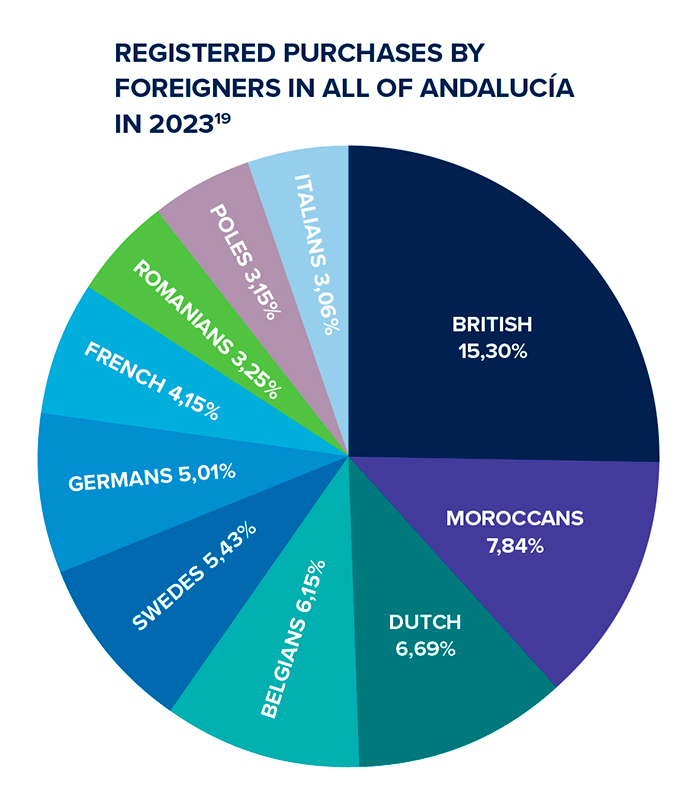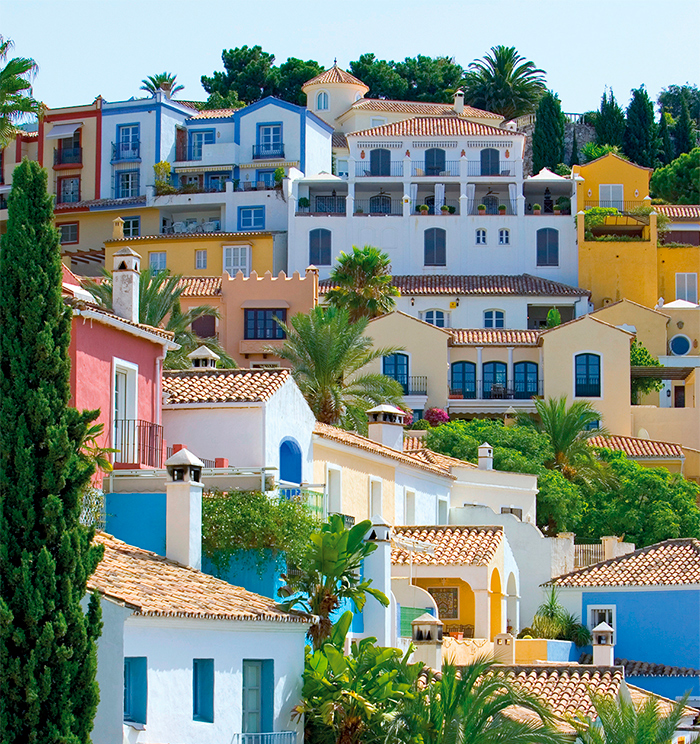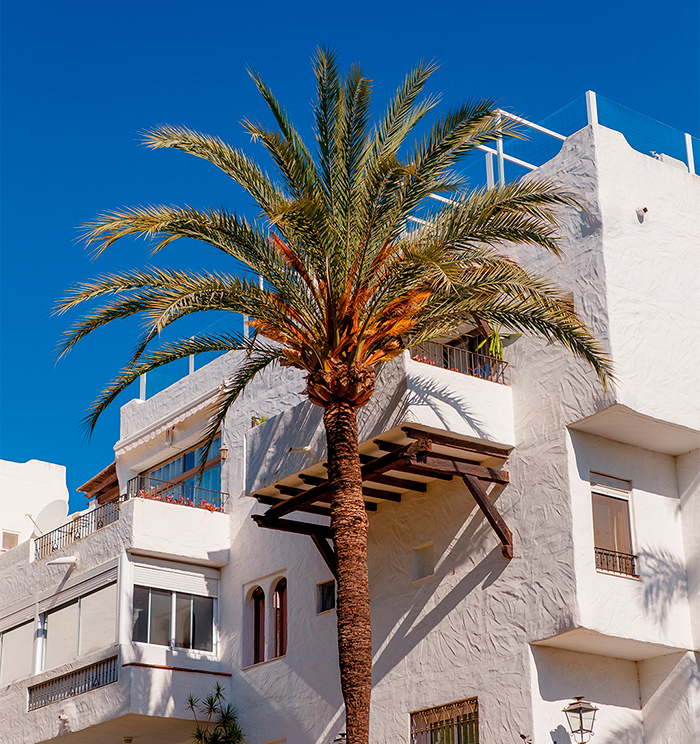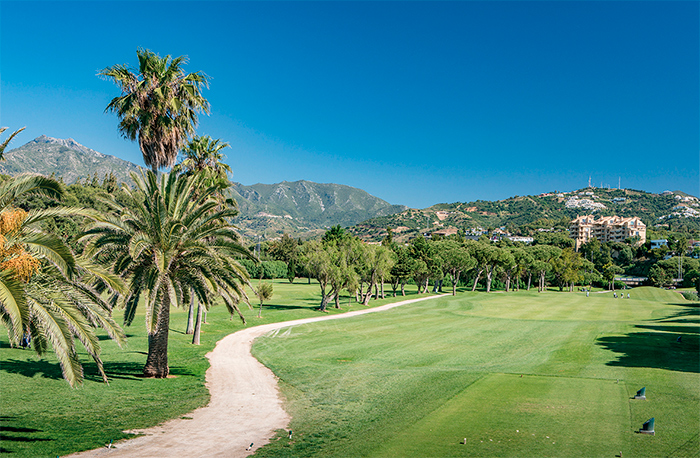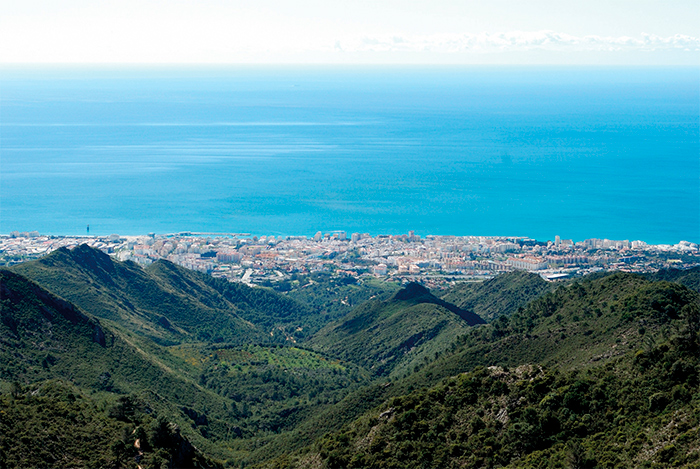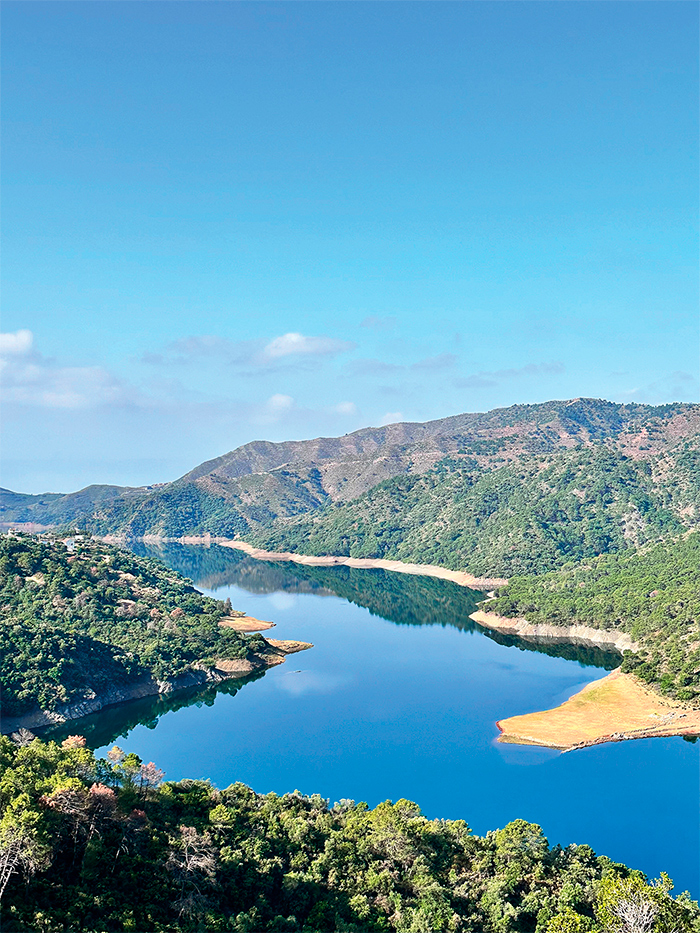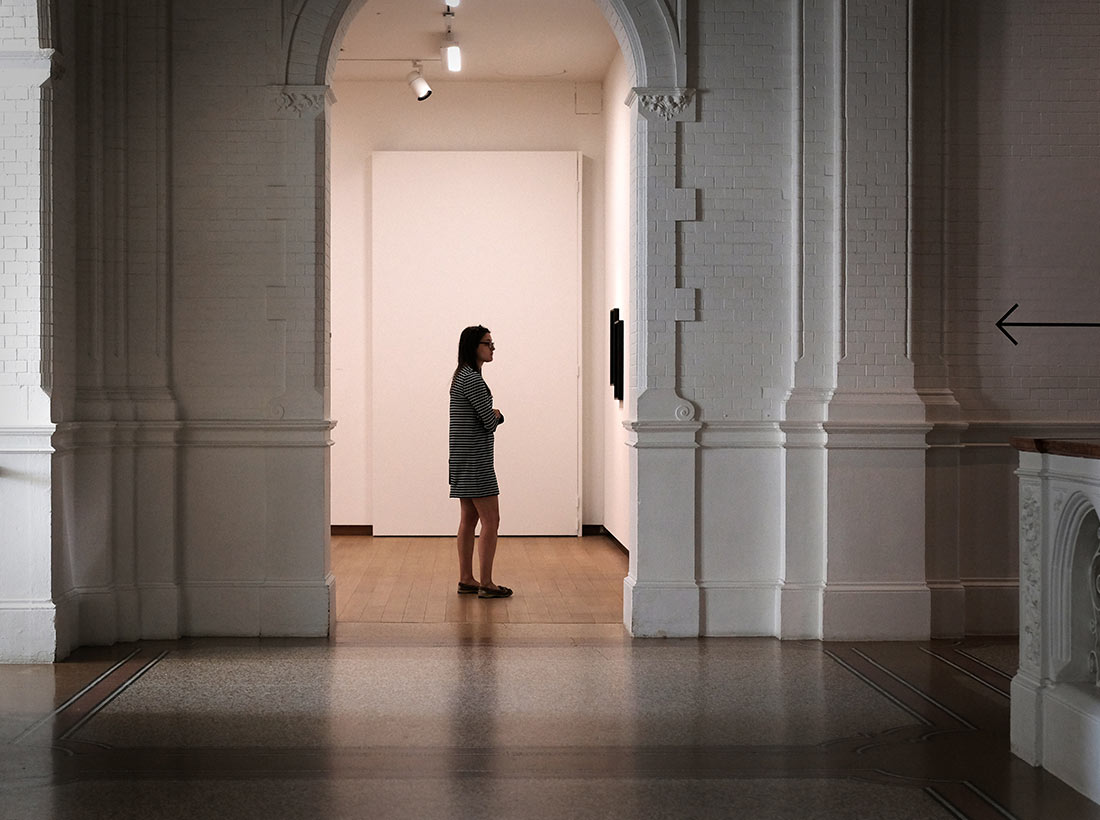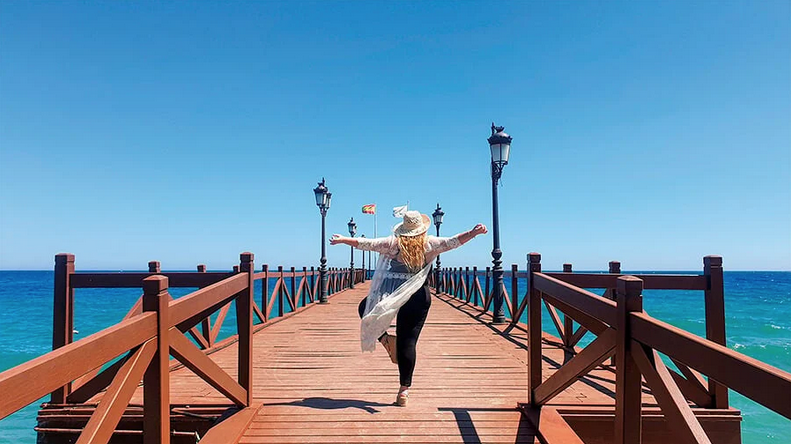
The residential property market in the Marbella area is undergoing a fundamental evolution that began with an unprecedented boom of sales activity just after the pandemic. The bar has been raised across all aspects of our real estate industry and service & hospitality sectors to unseen levels, and it’s staying there.
Marbella is now a consolidated ultra-luxury destination
Construction qualities and architectural designs that once seemed reserved for a few choice resort cities in the world have now become commonplace in the Marbella area. The quality of food, service and world-class décor in top-end restaurants is equal to the best in the world, the category of shops and brands that adorn the local streets and neighbourhoods, and the stars that line-up at local musical events lend a lustre and grandeur to the Marbella area to which new and old residents alike have quickly become accustomed.
There are few places like Marbella that have ever entered into the “ivy league” of true ultra-luxury resort destinations. In the hearts and minds of the most affluent classes on the planet, this new level of omnipresent ultra-luxury is what makes Marbella even more suitable for year-round living than it already was to them as a holiday destination.
Individuals and families of extraordinary wealth are spending more and more time in Marbella, and finding themselves increasingly among their circle. And this is what makes this new era of Marbella’s evolution so special. “Hot spots” show up every now and then, but few destinations in the world can really claim to be a consolidated ultra-prime residential resort destination. Marbella is indeed in good company.
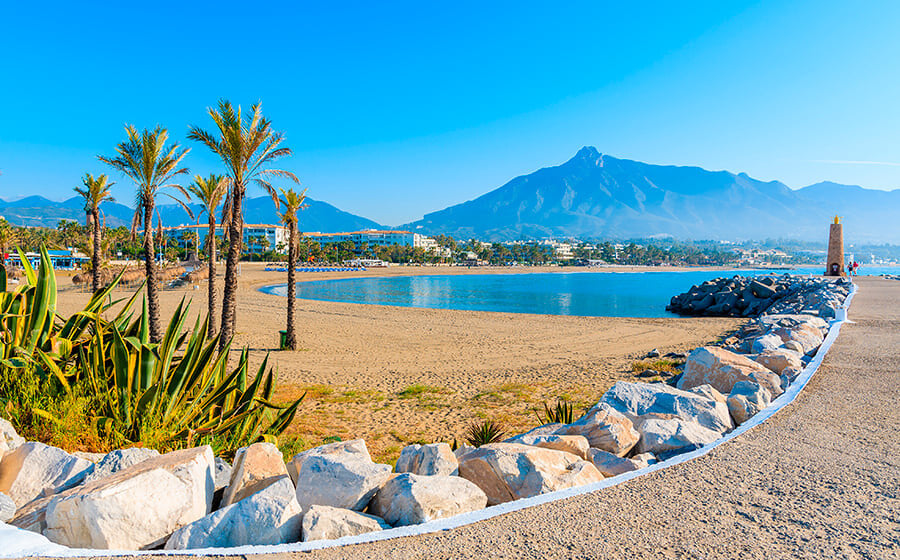
Marbella’s global recognition as a truly top-tier destination
It’s not just something tangibly in the air to residents and visitors: Marbella is recognised as being in the highest echelon of luxury destinations by its receipt of the most prestigious accolades, such as the coveted European Best Destination award in 2022 for being the most prestigious and exclusive destination in Europe, an award given by the most visited website dedicated to travel and culture in Europe, as well as winning the second prize that year for the Best Overall Destination, beating the likes of Monte Carlo, Gstaad, Capri and Madeira.1
And in 2024, European Best Destinations awarded Marbella the top prize of Best Overall Destination. The importance of this award, resulting from the votes of more than one million seasoned travelers, cannot be underestimated. Everyone is now talking about Marbella.
The town has also been recognised for its pristine beaches, having been awarded 11 Blue Flags in 2024 (two more than last year) – the most in Andalucía. This achievement underscores the high quality of Marbella’s coast and places it at the forefront of European ‘sun and beach’ destinations.
A thriving city year-round

Not only has Marbella achieved world-wide recognition as a 5-star resort destination and a pioneer city in “residential tourism”, the “low season” of the winter months has virtually ceased to exist. This has always been the full potential of Marbella, and the reason Panorama opened its agency here in 1970.
Marbella’s updated census data from January 2024 of 165,871 registered inhabitants, of which almost a third are foreigners from 153 countries (of the 195 recognised countries in the world),2reflecting its dynamic demographic evolution and cosmopolitan character.
However, to this registered population one must add the “floating population” comprised of tourists staying in their own homes and visiting hotels, which in the winter months alone, adds another 100,000 people to make around 265,000 inhabitants off season, expanding to at least three times that figure in the summer months.
Wealth beyond the material
With so much investment on all levels, Marbella has become a very wealthy city. Yet, an important part of the real wealth of Marbella is not just material, but a result of the innumerable different types of lifestyles available, and especially the outstanding example (among many notable failures in Europe) of a multi-cultural society where so many people from so many different nationalities are living together in harmony, with mutual respect for each other.
Additionally, Marbella’s location, right at the southern tip of Europe, offering Europe’s best climate and far away from the present and potential problems of Europe’s big cities, makes this area a “safe haven” not only for investment, but especially for peaceful living.
An address in Marbella has always been a symbol of international prestige, today more so than ever before. As our Mayor, Ángeles Muñoz, recently stated, “Marbella distinguishes itself from other resort destinations by offering a one-of-a-kind blend of world-class hotels, residential properties, services and facilities, solidifying our position as one of the most significant resort cities in the world.”
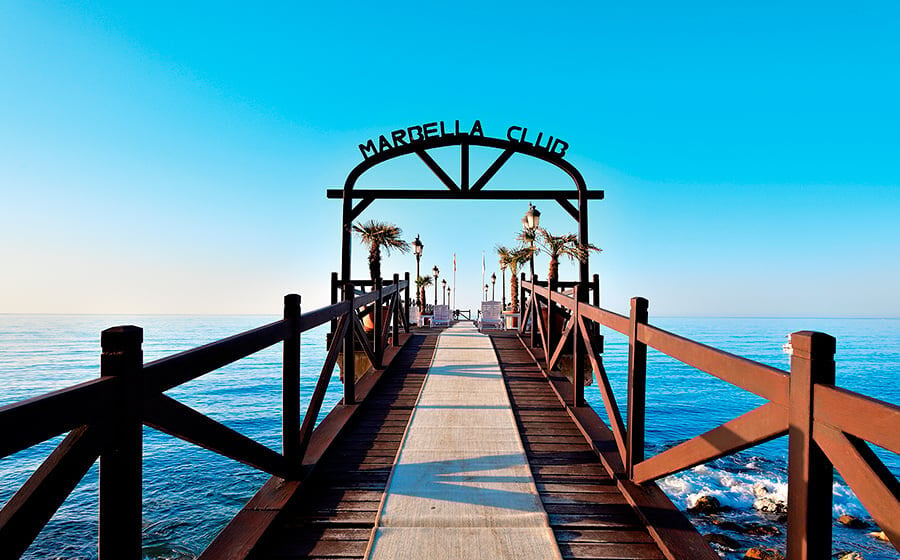
Both new and established hotels and restaurants are thriving
The most emblematic, landmark hotel in Marbella, the Marbella Club, started life as the Hohenlohe family’s beachfront Mediterranean hideaway on the Golden Mile, Finca Santa Margarita in 1946, and was re-born as the Marbella Club Hotel in 1954. It was from there that the Marbella we know today was founded.
In addition to the magnificent anniversary celebrations that took place at the hotel in the last weekend of April, the month of June saw the celebration of what would have been Prince Alfonso von Hohenlohe’s 100th birthday.
The hotel has always maintained its iconic status among celebrities and personalities since those first heady days and continues to be the central point of reference for the luxury Marbella lifestyle. It was recently awarded two Michelin Keys, the most recent distinction (for hotels) of the Michelin Guide and also recognised as “the most emblematic hotel in the area”.
Condé Nast agreed with this recognition and in July awarded the hotel the Condé Nast Traveler España Award 2024 for the Best Iconic Hotel.
It’s sister hotel, the Puente Romano Beach Resort also continues to grow in status and luxury offerings, and is now recognised as a culinary landmark on the coast. Home to more than 20 restaurants and bars, including the world-renowned restaurants Cipriani, Gaia, Coya and Nobu it has become the quintessential location for Marbella dining and nightlife.
The latest famous restaurant to grace the already sublime offering is the iconic El Pimpi Bodega & Restaurant – part of the historic Pimpi wineries established in Málaga in 1971. The opening celebration in May, 2024 was led by Antonio Banderas, part owner of the restaurant specialising in a traditional Andalusian cuisine, who gave an emotional speech highlighting the significance of the city where his daughter was born and his enthusiasm for the second restaurant of the El Pimpi chain to be opened.
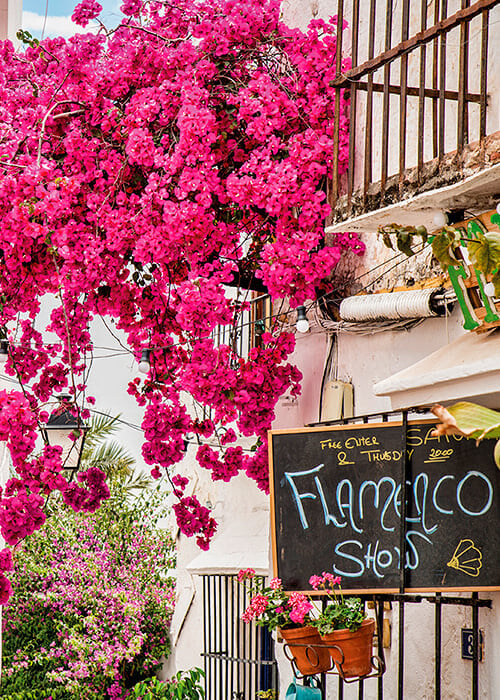
An unprecedented boom in high quality tourism
Quality tourism is not only important for the wealth it brings to Marbella, but has always been the first step to introducing people to the area, many of whom later decide to buy properties.
It is an integral part of the model of residential tourism of which Marbella has been a pioneer since the mid-’50s. A brief analysis of the market in tourism is therefore essential as a part of any property market report.
In 2023, Spain received more than 85 million tourists, its best year for tourism ever, 2% more than the pre-pandemic year of 2019. And up to the end of May, 2024 the number of tourists increased by 13.6% compared to the same period of 2023, to around 33 million.
The National Institute of Statistics confirms that the United Kingdom continues to be the main source of arrivals with over 4.4 million people recorded, followed by Germany with 3.18 million and France just behind on 3.14 million. The Belgian market has seen a growth of 25% and the United States at nearly 15% so far in 2024. Tourism Minister, Jodri Hereu, said: “The results for the first months of the year are a record as international tourists enjoy a range of innovative offers.” 3
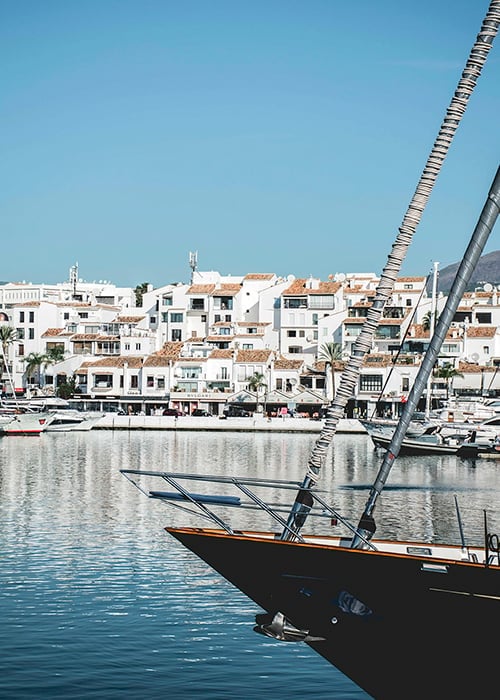
Marbella reached record tourist levels last year and is continuing to break records this year.4 The whole Costa del Sol also celebrated 2023 as “the best tourist year” in its history, with 14 million tourists, marking a 9.4% increase over 2022 and surpassing the previous record set in 2019.5
2024 is continuing to set records with an 18% increase in the first four months of the year, compared with 2023. This growth occurred despite January and February being typically lower-activity months and unmet expectations for Easter. The total of 8,010,003 overnight stays in hotels and legally authorised tourist accommodations indicates the virtual disappearance of seasonality in the market, with tourist visits now spread more evenly throughout the year. And in June, 2024 hotels on the Costa del Sol achieved an 87.8% occupancy rate, and expect a 90% occupancy in July up from 84.6% in 2023, with August even higher.6
Increase in visitors from the US, Canada and the Middle East.
Over the last year, Marbella has seen an increase in luxury tourism from Middle Eastern and North American visitors, interested in both exclusive accommodations and prime real estate. Visitors aged 35-50 from the US, Canada, and the Middle East are renting and buying high-end properties. North Americans are drawn to Spain, with Marbella becoming a hot spot for its quality of life, gastronomy and golf courses. The local government has partnered with Virtuoso (a major US luxury travel platform) to specifically attract this market, highlighted by events like the Solheim Cup.
Middle Eastern tourists from the UAE, Saudi Arabia, Qatar and Kuwait are also returning to Marbella with a 10% increase in 2023. The city has promoted itself in these markets with the help of the Spanish Luxury Association.7
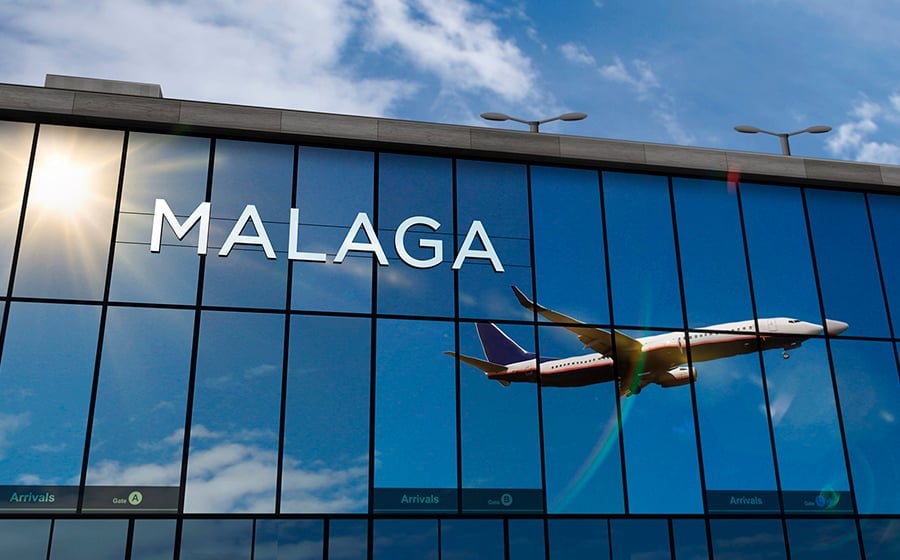
Malaga airport breaks all records.
From January to June 2024, Málaga airport saw an increase in passengers of one and a half million more than in the same period last year and has exceeded for the first time the barrier of eleven million passengers in six months, almost touching the 11.5 million mark, who have travelled on 80,788 flights.8
Vip services being offered at the airport.
The airport is meeting the demands of the international travelling elite with the introduction of a new luxury service that includes separate check-in without queues and private security checks. Travelers will be picked up from their hotels, have their luggage handled by staff, and be escorted to a private lounge, before being directly transferred to the aircraft. This service, provided by Ambaar, will be located in Terminal 3 and will cater to both departing and arriving passengers.9
Marbella is not just for the wealthy
In just 70 years since the opening of the Marbella Club in 1954, Marbella has evolved from a quiet, charming coastal village with agriculture and mining as its principle industries and a population of less than 10,000 inhabitants, to being among the 20 preferred residential and investment destinations on the planet.10
The popularity of Marbella is not just among the most affluent. This amazing community attracts people from all fields and all parts of the world, including those who want to work remotely. And for these, the Spanish Government is now granting a “Digital Nomad Visa” with potentially significant tax advantages, along with many other types of visas.
Marbella is also attractive to a great number of retired, or semi-retired, people who spend all or part of the year here, as well as those who have decided to move permanently to the area and open businesses here.11 And even artists are drawn to Marbella not only for the unique lifestyle but for the quality of the light and the magic of the Andalusian people and countryside.
But Marbella is not for everyone, as there are so many wonderful destinations around Spain and Europe and further abroad with different qualities and unique characteristics, and this is as it should be.
KEY MARKET INDICATORS: Market demand, supply and prices
The extraordinary phenomenon that has been the “normalising” of Marbella as an ultra-luxury resort has been evident, perhaps more than in any other sphere, in the local real estate market. The strong demand for large, modern and impeccable villas in prime Marbella areas has led the demand across all real estate price ranges.
Sales figures for 2023 were impressively strong: nationally, 12.3% higher than the pre-pandemic year of 2019 and locally, 24.55% higher. The spike in sales in 2022 broke all previous records, both locally as well as nationally, and was clearly due to the pent-up demand created by the Covid restrictions.
The two charts below give a great illustration of not only the number of sales since 2007 on a national and local level, but also of the housing supply shortage both nationally and locally: just compare the number of new homes built in 2007 (over 300,000) compared with those built last year (slightly over 60,000).
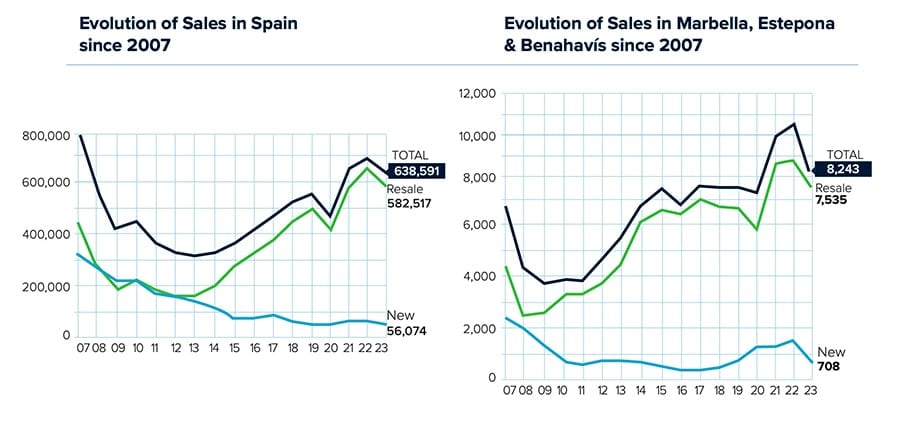
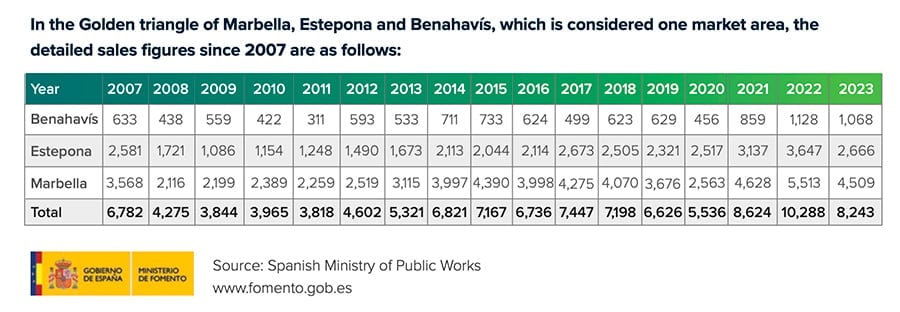
Please note that these statistics only show the number of properties sold each year, as per the title deeds issued at the notaries, and don’t reflect the sales of properties that are under construction or off-plan.
In 2023, 638,591 properties were sold in Spain of which 56,074 were new and 582,517 resale (used). In Marbella, Estepona and Benahavís the total number of sales was 8,243, of which 708 were new and 7,535 resale.
Unfortunately, official statistics simply do not provide all the information which would be helpful in compiling this report, such as the numbers of sales in different price categories, or even purchases off-plan or under construction. In these cases, we have to analyse the market more by tendencies, trends and informal interviews with other local agencies.
Interest rates do not significantly affect the Marbella luxury real estate market.
The sharp increases in interest rates in Europe in the fourth quarter of 2022 and continuing into 2023 have finally begun to level off as inflation gradually comes under control. In June, 2024 the ECB lowered the three key interest rates by 25 basis points in line with expectations, marking a shift from nine months of stable rates, after inflation declined by more than 2.5 percentage points since September 2023.
Less than 10% of purchases are made with mortgages in Marbella’s luxury end of the market – which we define as those properties with selling prices in excess of €2,000,000.
But while the relatively high interest rates made buying homes more expensive for those requiring mortgages, it is interesting to note that, less than 10% of property purchases are made with mortgage loans in Marbella’s luxury end of the market – which we define as those properties with selling prices in excess of €2,000,000.
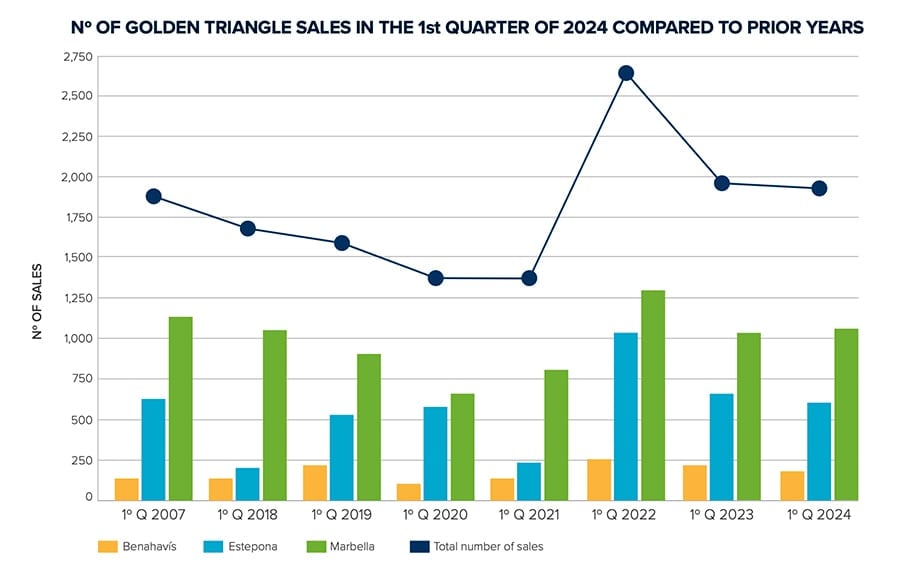
So far in 2024, and with respect to the sale of properties in the luxury end of the markets priced over €2 million, the numbers are stronger than in 2023 in accordance with Panorama’s own statistics and reports from other agents
Moving on to the first months of 2024, below is a graph of the first quarter sales figures in Marbella, Estepona and Benahavís compared with prior years’, where the sales in the first quarter of 2024 still exceed those of the pre-pandemic year of 2019 by 19.47%, clear evidence of the continuing historically strong market. Nationally, the number of properties purchased by foreigners in the first quarter of 2024 was the third highest in history.12 In fact, so far in 2024, and with respect to the sale of properties in the luxury end of the market priced over €2 million, the numbers are stronger than in 2023 in accordance with Panorama’s own statistics and reports from other agents specialising in luxury properties.
What about prices?
Asking prices in all categories in Marbella have risen, on average, by 13.7% between June 2023 and June 2024, reaching a new all-time high of € 4.812/m2 – more than double the average asking price per square metre of 10 years ago, according to the most important Spanish real estate portal, Idealista.13 Although this figure does not represent real sales prices, it is an excellent orientation with respect to what the increase in real sales prices will have been on average in Marbella.
A lack of supply.
A study performed by Idealista for Panorama found that the stock of properties for sale in Marbelladropped yet again on average by 9.03% from the second quarter of 2023 to the second quarter of 2024, and up to almost 18% in East Marbella. Clearly, and in accordance with the laws of supply and demand, a diminishing stock of properties coupled with an increasing strong demand always leads to an increase in asking and selling prices.
Examples of real sales prices in Marbella in 2024, broken down to price per square metre
Nothing is better for price analysis than real selling prices. In the charts opposite we have included real sales prices per square metre of a mix of typical properties sold by Panorama in different areas of Marbella in the first half of 2024.
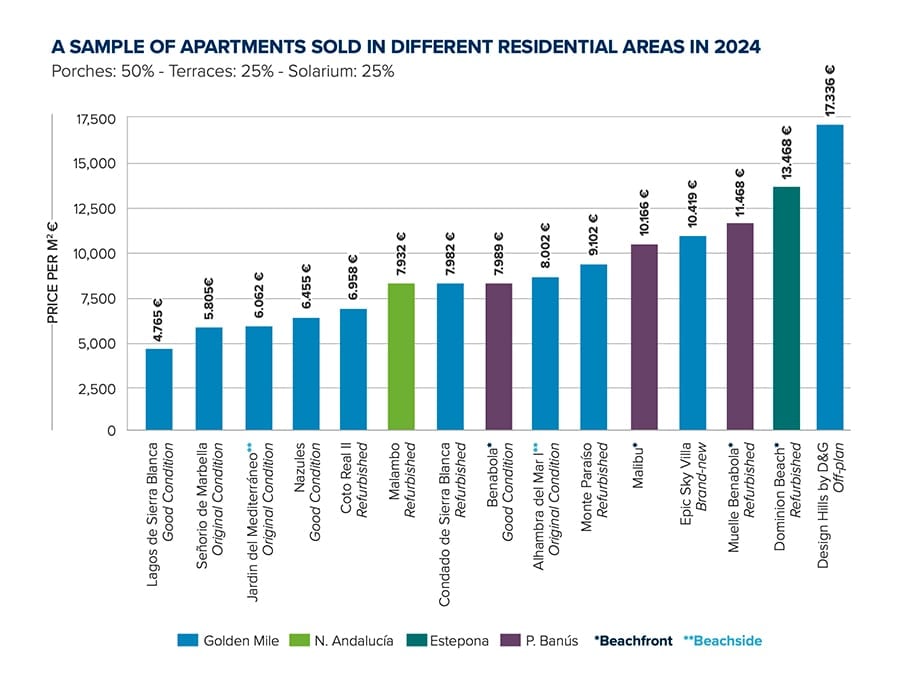
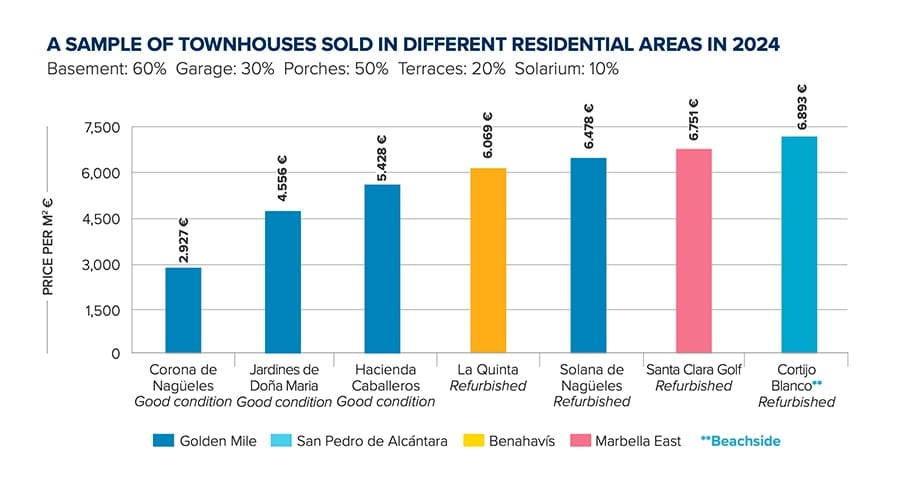
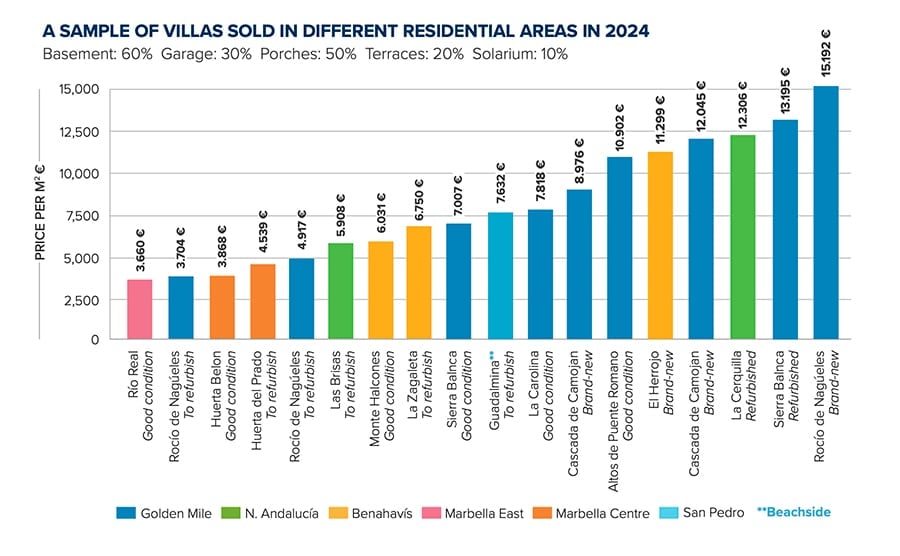
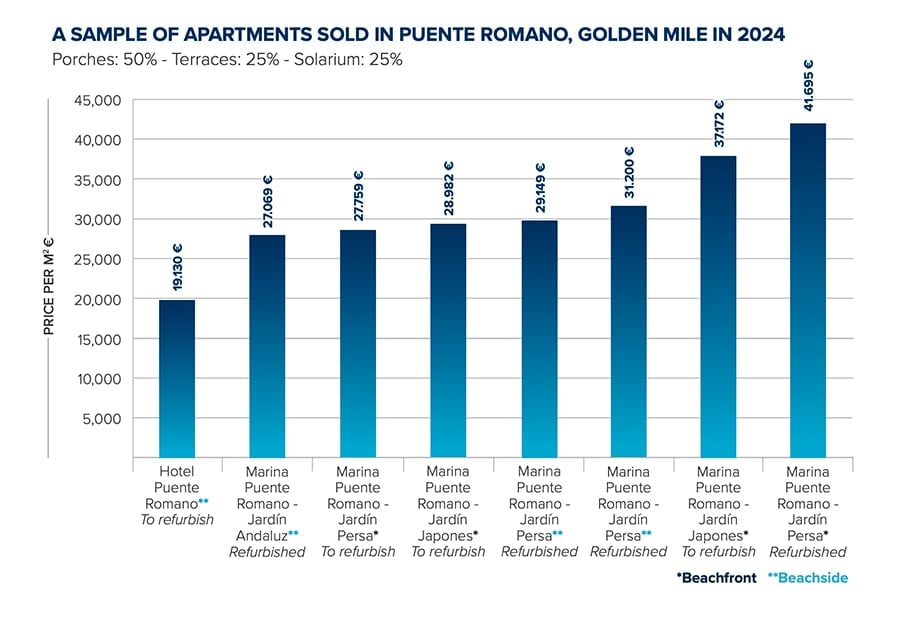
Notwithstanding the enormous price increases of the past years, there is hard evidence that Marbella’s prices, even at today’s levels, remain very competitive. Of the 50 most costly municipalities in Spain, Marbella is only number six on the list, which is headed by Sant Josep de Sa Talaia in Ibiza, at €6,295/m2. Globally, Marbella moved from 16th place in 2022 to 13th place in 2023, just ahead of Mallorca and Vancouver, as quoted in the Knight Frank 2024 Wealth Report, with Monaco leading as the most expensive city to buy prime property in the world, at an average sales price of over €58,000 per square metre.14
As a general rule of thumb, prices for new or refurbished luxury apartments in the Marbella area start at €6,000/m2 and go up to over €30,000/m2 in the most sought-after beachfront areas of the Golden Mile, sometimes even higher in the case of certain unique properties. Prices for new or refurbished villas, start in the region of €8,000/m2 and go up to €14,000/m2.
According to an article published by the Bank of Spain, “due to the scarcity of new construction, the high costs of construction materials and the favourable financial situation of the different buyers in the market, the price of housing will continue to demonstrate resistance to decrease, in spite of the other variables in the residential market, such as sales volume or the number of properties approved for construction.” With the beginning of the reduction in interest rates, this tendency will no doubt accelerate.15
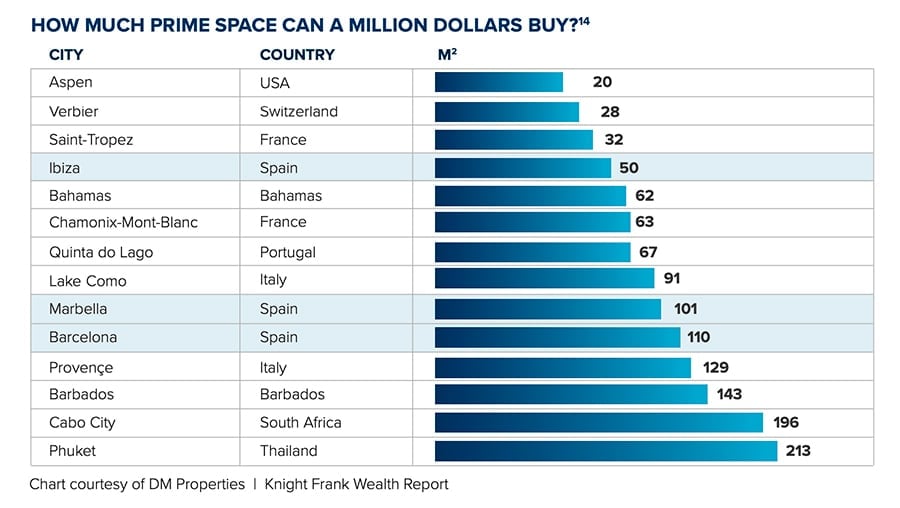
Over 50 years of perspective.
Panorama has seen the real estate market in Marbella evolve over the last 54 years – since we opened our first office here in 1970. Marbella’s growth trajectory has continued on a sharp upward curve ever since the 1960s. Marbella might now be the 6th most expensive municipality in Spain,16 but it’s still very good value compared to other top resorts. Properties in Marbella area provide more physical space, either in land area if we consider single family homes, or built area with respect to apartments and townhouses, compared to many of the world’s leading luxury markets.17
Resale asking prices sometimes overly-optimistic.
In part because of the historical lack of reliable statistics in Spain with respect to real sales prices and the increase in prices over the last years, added to the fact that the market is clearly a “seller’s market”, we are beginning to see some owners place their properties for sale at prices which are overly optimistic, especially in the higher price ranges. Some have gone too far, pricing their properties at a level that doesn’t even entice viewings. Consequently, these properties sometimes don’t even reach the market place. When this happens it always corrects itself with time: those asking too much have to accept the reality that although the market is good, it’s not what they had hoped it would be!
The key for a buyer to understand real market value is to work with an agent who has the professional experience to be able to demonstrate real selling prices per square metre of comparable properties, which is the only viable manner of determining current market value.
Who is buying?
British, Dutch, and Swedish nationals are the top foreign buyers of homes in the province of Málaga, contributing to a third of all property acquisitions in the area. British buyers lead with 15%, followed by Dutch and Swedish buyers at 8% each. The demand from international buyers in the province of Málaga, representing 33.7% of the total number of properties sold in 2023, continues to significantly influence property prices.18
Panorama’s own sales in the Marbella area over the last three years have been to clients of 45 different nationalities, with the following percentages:
- United Kingdom: 18.58%
- Sweden: 10.78%
- The Netherlands: 8.5%
- Spain: 6.69%
- Belgium: 6.32%
- Germany: 5.95%
- USA 3.35%
- Denmark 2.97%
- France 2.97%
- Ireland 2.97%
- Poland 2.97%
- Russia 2.97%
33 other nationalities comprise the remaining 25% of the nationalities buying properties through Panorama.
Contrary to initial expectations following Brexit, British residential tourists continue to buy properties on the Costa del Sol and in Andalucía, particularly in the luxury market.
British investment in Marbella’s real estate sector has grown by an average of 20% over the past two years. Contrary to initial expectations following Brexit, British residential tourists continue to buy properties on the Costa del Sol, particularly in the luxury market. Despite economic challenges, confidence in the Spanish real estate market remains high. According to Marc Pritchard, Sales and Marketing Director at Taylor Wimpey Spain, there has been resilient demand for quality living in Spain, especially in golf-related properties.20
In an interview with Idealista, Alfredo Milá, CEO and founder of Sonneil Homes, noted that International buyers, particularly Polish, have increased their presence significantly, while the activity of Ukrainian buyers has normalised, and Czech buyers are emerging for the first time in the market.21
Real estate is booming across Spain
The well-known Spanish economist Gonzalo Bernardos predicts a spectacular boom in the Spanish real estate market beginning in mid-2024. During a recent presentation in Valencia, Bernardos emphasized the imminent surge in demand, which will significantly impact both the volume of business and prices. Key factors driving this positive trend include a shortage of new constructions, lowering-interest rates, increased bank lending, a growing foreign population in need of housing, a shift from renting to buying, and a favourable economic environment.
The best time to buy real estate in Marbella was yesterday, and the next best time is today
Unlike previous booms, Bernardos assures there is no risk of a new housing bubble due to the different conditions now. “Banks have more deposits than loans. They do not need financing from abroad, which is why the number of loans will increase. The market is full, there is no danger. The demand from foreigners is like never before. There is job creation and salary increases. It is the perfect time for the real estate business.”22
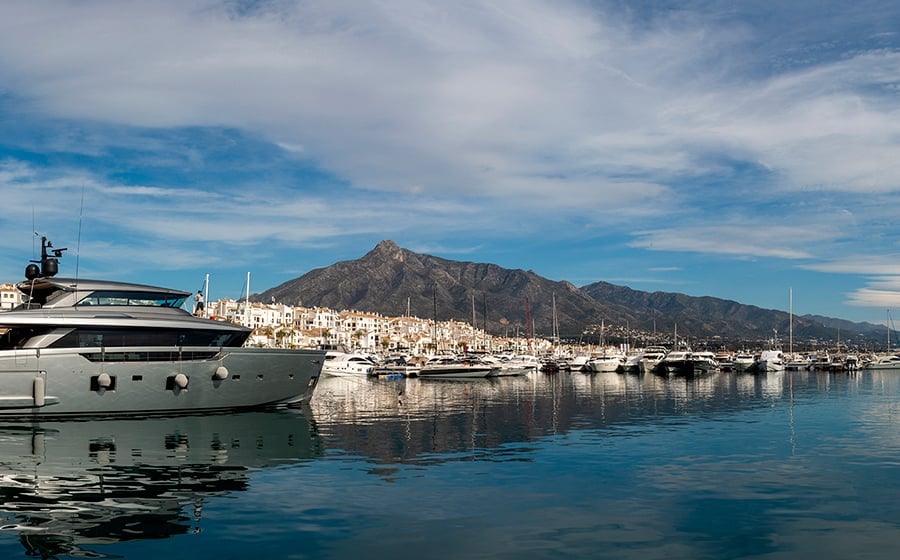
Carlos Almeidos of CBRE joins Bernardos along with Elayo Barroso, national director of Savills Research, and many other leading professionals in their belief that the market evolution evidences that now is an excellent time to buy real estate in Spain.23
This statement sums up the general sentiment of urgency and optimism about purchasing property now.

The rental market
Long-term rentals.
Prices for long-term rental properties in Marbella area have continued to increase significantly throughout the municipality and across all price ranges, and properties available for long-term rental are extremely difficult to find. Many owners that used to rent on a long-term basis have decided to take advantage of a booming short-term rental market, and this, coupled with a chronic lack of supply, is pushing the prices ever higher.
The average price of a relatively simple, well-furnished two-bedroom apartment for rent in a good location in Marbella is between €1,400 and €3,000 per month, and there are no signs of this tendency abating due to the consistent demand. The basic minimum salary in Spain is now around €1,300 per month, hence many properties are unaffordable to much of the working population, in particular, young people. This is driving workers to rent property further afield, and people commuting to work in Marbella sometimes from 30 minutes away, or more, is now a common phenomenon among much of the local work force.
The long-term rental market share is composed of a number of different demographics: the classic tenant employees such as civil servants, office, shop and hospitality staff. Then we have the well-established “leisure-year” international clients with good budgets looking to bask in the year-round sun. Also, the rise of international business commuters and digital nomads who can work from any location. Then there are families of all income types coming to settle in the area, some to work, some to enjoy life, many of whom eventually will buy.
According to statistics from Idealista, long-term rental prices per square metre in the Golden Mile and Nagüeles now stand at 19,2€/m2 per month, representing an increase of 10.3% from the square metre price of 2023. Other areas such as Nueva Andalucía and Los Monteros in east Marbella are now averaging 18,4€/m2 and 16,7€/m2 respectively showing an increase of 11.1% with respect to 2023.
Marbella has experienced its own metamorphosis from a timid rental market with ample supply pre-2000, to a market running along the lines of Madrid or Barcelona due to a soaring demand against a decreasing supply of long-term rental properties.
Short-term rentals for touristic use.
With the Regional Government’s (Junta de Andalucía) new modifications to Decreto 28/2016, dated 2 February 2016, which regulates dwellings for tourist use (Decreto 31/2024 dated 29 January 2024), a whole new series of requirements have been established with the aim of professionalising short-term rentals. These are defined (among many other qualifying factors) as rentals of properties of less than two months’ duration, on a regular basis and for touristic use.
While the prior VFT authorisation number from the regional government remains valid, the designation has been changed to VUT (Vivienda de Uso Turístico or residence used for touristic purposes).
From 22 February 2024, with the entry into force of the new Decree, owners of tourist accommodation are obliged, among other things, to provide users with a 24-hour telephone number to immediately attend to and resolve any query or incident relating to the accommodation.
Before August 22, 2024, the following requirements must be met:
- If the management of the touristic rentals of the property is carried out by an operating company, called an “empresa explotadora,” in place of the actual owner, this management company must be registered with the Tourism Registry of Andalucía by 22 August. This entity must take the full legal responsibility in front of the Regional Government for fulfilling the requirements of the VUT law and managing the rental.
Whether managed by the actual owner or the operating company, these responsibilities include:- ensuring the registration of the touristic property and tenants with the Police
- proper equipment, furniture and fittings of the property, according to the new law requirements
- the handling of all bookings, key delivery, check-in and check-out, 24-hour emergency contact with the property manager, cleaning services if offered, repairs and breakdowns, invoicing, etc.
- The “operating companies” are much closer to the hospitality industry in their nature than normal real estate agents, although real estate agents can also register as the responsible party provided they comply with all provisions of the law and that their company statutes allow them to carry out this specific activity.
Real estate agents can continue introducing tenants to owners or to the management agency, if one has been designated by the owner, without declaring themselves as the responsible party, but real estate agents can no longer assume the role of managing the short-term rental itself without this declaration.
Marbella has experienced its own metamorphosis from a timid and easily-handled rental market pre- 2000, to a market running along the lines of Madrid or Barcelona.
- The exact periods in which the property will be available for short-term rental must be specified in advance through an automated, electronic-only procedure. Advertising and availability must be adjusted in accordance with the periods that have been communicated. Additionally, tourist rentals cannot be conducted outside these stated periods.
- The number of bedrooms, bathrooms and maximum guests (occupants) must also be communicated.
By 22 February 2025, new requirements for compliance with air-conditioning, kitchen, and bedrooms must be met:
- Provide air-conditioning and heating during the declared available period.
- Kitchens must be equipped as specified in the Annex to the Decree, including the following, among others: selective waste separation, smoke detector or fire extinguisher.
- Comply with new requirements for bedrooms, such as the dimensions of beds and mattresses, light points, wardrobes, and provide extra sets of bed linen.
Finally, owners who have not registered their property and wish to rent it for short-term periods for tourist use must register with the Tourism Registry of Andalucía and comply with all of the requirements of the Decree from that point forward.
Properties that are not registered with the Regional Government for short-term rentals (referred to as “clandestine properties”) or which are not fully compliant with the new requirements are subject to cancellation procedures and serious fines, up to €18,000 and in some cases, more.
The new law requires careful study, and property owners who are not yet in compliance should seek professional assistance.
There are 6,991 tourist residences currently registered in Marbella, representing 6.9% of the total of 101,318 homes in the municipality, compared to 41,038 in the whole province of Málaga, and 340,424 in all of Spain, according to the National Statistics Institute. Marbella is the fourth city in Spain in number of touristic residences, behind Madrid, Barcelona and Málaga City.24
Properties which are not registered with the Regional Government for short-term rentals, or which are not fully in compliance with the new requirements are subject to cancellation procedure and serious fines, up to €18,000 and in some cases, more.
Municipal governments can limit or prohibit short-term touristic rentals, although unlikely for now in Marbella
In many large cities in Spain and touristic hot spots around Europe, long-term residents are being driven out of the most popular areas due to the sheer number of properties that are being made available as short-term touristic rentals with the promise of good income potential. As such, under the new law, municipal governments have been given an important role under the new regulations and have the authority to limit or even prohibit touristic residences in certain neighbourhoods they consider necessary to protect the public interest.
In this respect Marbella is viewed as an area which is less “stressed” compared with the many large city centres in the rest of Spain and the world: in Marbella only 6% of the properties for short-term rent are located in the centre of the city.
According to the Mayoress “the pool of short-term rentals consists mostly of properties rented to high-net-worth visitors.” This, coupled with the fact that most of the short-term rental properties are owned by foreigners who return to use the properties themselves for the rest of the year, is the reason why Marbella has fewer problems compared with the big cities.25
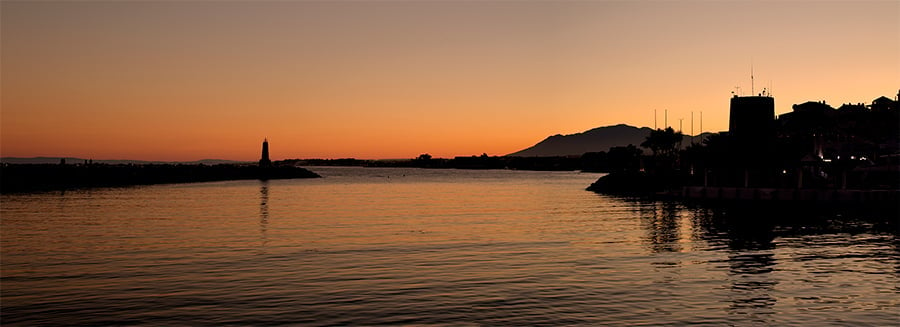
Notwithstanding the above, the Town Hall has ordered a new study by the University of Málaga, to supplement the study performed in 2018, to analyse if there are any factors in touristic rentals which cause market disequilibrium or irregularities in Marbella.26
The national government has also announced plans to create another registry of touristic residences to be able to impose its own criteria on these properties.27
The trend towards regulating short-term rentals seems unstoppable and is happening throughout Europe with new similar laws being considered by the European Union. With what may well be four levels of government (local, regional, national and EU) involved in controlling touristic residences in Spain, this is good news for short term rental tenants, requiring an overall professionalism and guarantee of quality of the sector and any problems involving touristic rentals will get weeded out quickly. But it does mean that property owners or investors that have short-term rental properties are facing additional red tape in order to properly comply with the law.
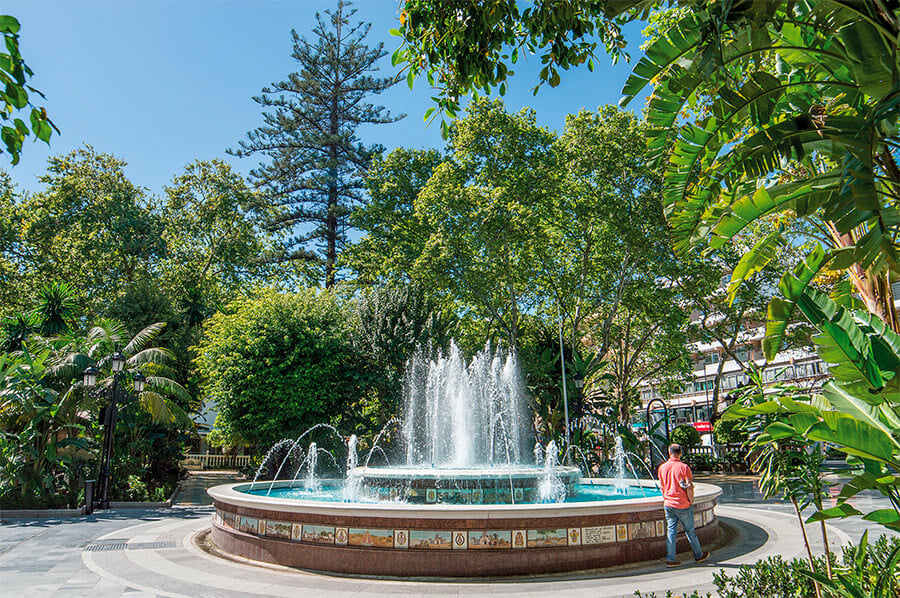
A booming local economy
The Marbella City Council reported record-breaking economic figures for 2023, with over 80,000 contributors to Social Security and the lowest unemployment rates in its history. Alejandro Freijo, the advisor responsible for Employment, Economic Development and SMEs, highlighted that the city not only recovered to pre-pandemic levels but also exceeded expectations. “Marbella has achieved the best results since December 2007 and has managed to reduce unemployment by 28 % over the last six years.” Other key achievements include an increase in the number of self-employed individuals to 14,339 – 400 more than 2022 and 1,300 more than before the pandemic.28
Reducing waiting times for building and planning approvals
The Marbella City Council reported a 40% increase in the issuance of urban planning reports during the first four months of 2024 compared to the same period in 2023. Between January and April, the city had already issued half the total number of reports generated in all of 2023, which amounted to 5,779.
Mayor Ángeles Muñoz highlighted this increase during the signing of an addendum to an agreement with the Málaga College of Architects. The agreement, initially reached in 2019, aims to expedite the processing of building permits in accordance with the Andalusian Law for Territorial Sustainability (or LISTA). The agreement will alleviate the bottle neck and ensure that all submitted documentation complies with legal standards, allowing for quicker approval of permits for various types of buildings. Muñoz believes this streamlined process benefits those looking to build in Marbella by reducing waiting times for project approvals.29
The increased workload has prompted the local government to improve citizen services with more resources. A new information and advisory office, operational since November last year, handles in-person, online, and phone inquiries. This office has four technicians and three administrative staff, significantly increasing its capacity to respond to residents.
It has recently been announced that the time to process building licenses has been reduced to only four months, a vast improvement over the year, or more, wait which had been prevalent in past years.
Users can inquire about land classification, property status, urban planning regulations, and license processing. This initiative complements previous measures to streamline urban planning, including the introduction of responsible declarations and faster processing of minor permits. To this end it has recently been announced that the time to process building licenses has been reduced to only four months, a vast improvement over the year, or more, wait which had been prevalent in past years.30
Investments totaling 800 million Euros
As more and more investors are coming to Marbella each year, the city foresees an investment of over €800 million in major construction licenses this year. The Mayor declared that municipal revenues from the Construction, Installations, and Works Tax (or ICIO) are expected to exceed €32 million in 2024, an increase of six million from the previous year.31
A sustainable budget
The municipal budget for Marbella in 2024 has increased by 10%, with projected revenues of €373 million. This growth is driven by higher property taxes, real estate transaction taxes, and construction permits. The budget, which does not rely on loans, reflects the city’s economic dynamism and commitment to investments and social policies.32
Future budget plans allow for more growth.
Marbella plans to increase its budget by €10 million annually until 2027, driven by population growth, the new general plan, and a boost in tourism. This financial strategy aims to cover rising costs and invest in new initiatives and infrastructure.33
Marbella’s new general plan
Marbella’s official population has grown by 6.7% over the past five years, and according to all sources, the unregistered or “floating” population, even more. This population growth is given primary importance in the context of Marbella’s new General Plan (or PGOM), along with emphasis and tools to provide for sustainable growth, applying the newest technology on all levels, and emphasis on the environment. The new plan focuses on Marbella as a “Garden City”, something Marbella has always been and is one of its most distinguishing features, compared with the many concrete jungles which have ruined much of the Mediterranean coastline.
A key feature of the new plan includes more flexible land usage regulations, allowing for strategic projects that may not fit well within urban areas, to be considered for construction on rustic land.
The new General Plan has been under development since 2019 and was initially approved on March 30, 2023. Final approval is scheduled for 2025, substituting the seriously outdated prior General Plan of 1986. The new plan aims to increase urban land by nearly 13 million square metres compared to the 1986 plan, raising it from 40 million to over 52.5 million square metres, with an additional 1% increase bringing the total to approximately 54 million square metres.
A key feature of the new plan includes more flexible land usage regulations, allowing for strategic projects that may not fit well within urban areas, to be considered for construction on rustic land. This flexibility supports economic development, employment, and wealth generation.
Examples of possible projects which might be considered for building on rustic land include universities, large facilities, sports complexes, social amenities, unique rural hotels and other facilities deemed to be in the public interest.
Marbella’s urban planning follows the new Law for the Sustainability of Andalusia’s Territory (or LISTA), which protects valuable rustic land while allowing the use of others for city development.34
The problems of growth: keeping up with our services and infrastructure
It would be naïve to think that rapid growth can continue without parallel attention to improving services and infrastructure, which is one of the major objectives of the new municipal general urban plan.
Traffic congestion.
One of the most important considerations is the traffic along the coastal road, the N-340. There is tremendous pressure from all the political parties in the central government to lift the toll on the AP-7 motorway – one of the few toll roads left in Spain – which will cause an immediate relief of traffic congestion along the entire coastal road.
Although there are obstacles placed by the central government, extreme pressure must be brought to bear not only by the politicians but by individual residents and the private sector. We predict that these efforts will be successful in the next months if enough leadership is provided by the different sectors of society in all of the affected municipalities between Fuengirola and Sotogrande where the current tolls remain in place.
Additionally, the Town Hall is taking urgent steps to add a third lane along the coastal highway between Puerto Banús and San Pedro where traffic congestion is an all too frequent event.
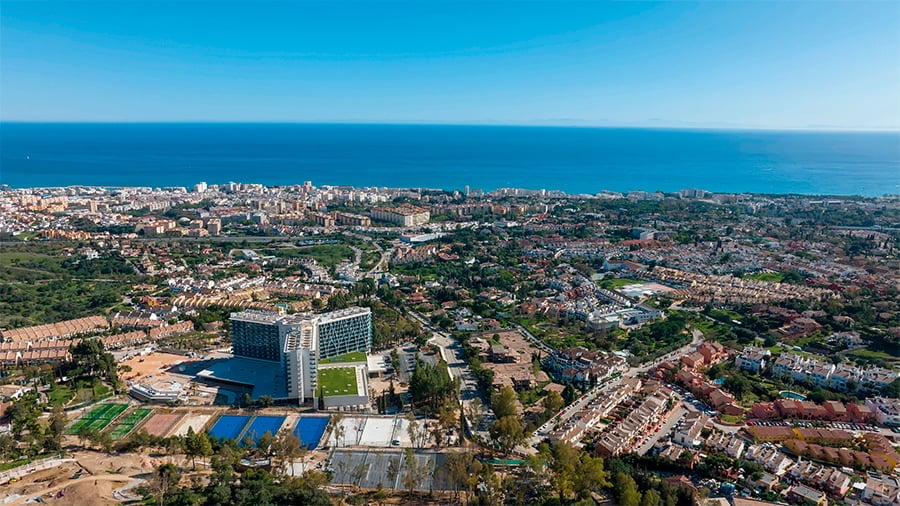
The coastal train again in the news.
Plenty has been written recently with regards to the necessity for the coastal train, already existing from Málaga to Fuengirola, to extend further to Marbella and later to Estepona and Algeciras.
Marbella is the only city of 160,000 inhabitants in all of Spain (not counting the important floating population) without train service. Even though it could take up to a decade to execute the first phase of this project, support across the political spectrum is reaching extremely high levels, and we have no doubt that planning for the continuing of the coastal railway will be reinstated in a short time.35
A historic increase in the size of the police force.
Just like any important tourist city, Marbella is not free of crime. Increasing population and tourism has created a need for reinforcement of the police force. To this end, since March of 2024, there is a record number of more than 400 national police agents in Marbella in accordance with the Plan Marbella and Plan for Secure Tourism. Special, elite forces with an outstanding success record, well trained in certain areas of criminal activity, have also been brought to Marbella.
Crime reduced in 2023 by 6.3% compared with the prior year. Hundreds of security cameras are being installed in the area, and a new national police station will be built shortly in San Pedro. According to the Mayor, “Marbella is a city of top-class tourism and consequently requires the best possible security. With our recent reinforcements and investments, we are quickly reaching this objective”.36
Drought and water restrictions in early 2024.
Due to little rainfall over the past three years, water restrictions were imposed in Marbella (and most of Andalucía), in the winter of 2023-2024, ending provisionally on 1 June 2024 due, thankfully, to sufficient rainfall during the days prior to Easter. Fortunately, the desalination plant installed by the former mayor, the late Jesus Gil, 30 years ago will double its capacity by autumn this year; many of the old municipal wells have been rehabilitated for usage; and four new wells have been drilled which will supply all of the water necessary for keeping the green zones and parks in Marbella in optimum condition.37 The desalination plant alone will be able to provide 20% of all of the water needs of the entire Costa del Sol when it becomes fully operational. The amount of water in the La Concepción reservoir in the summer of 2024 is greater than June 2023.
Further steps to amplify the reservoir, as well as other reservoirs along the coast, will have to be taken urgently, as well as the repairs to the distribution system which is up to 50 years old and leaking in certain areas.
The water level of the La Concepción reservoir in June 2024 is higher than in June 2023.
However, most coastal towns have already taken urgent measures to install desalination plants of different types, which collectively, along with the increase of the capacity of the reservoirs over time, and other conservation methods such as recycling of waste water, will assure the water supply of Marbella and the whole the Costa del Sol for generations to come.
€348.6 million has already been committed to improve the water supply infrastructure with a multiple of that figure to be anticipated over the next months and years.38
Confidence in Marbella is at an all-time high
Despite the many problems around the world, confidence in Marbella’s future is at an all-time high. The Marbella property market is undergoing the most interesting and successful periods of its history.
Marbella is in a much stronger position than ever before to deal with any issue that the future might bring, thanks to the substantial wealth generated by its many thousands of residents, tourists and investors on all levels who, together with good local governance, have made Marbella what it is today.
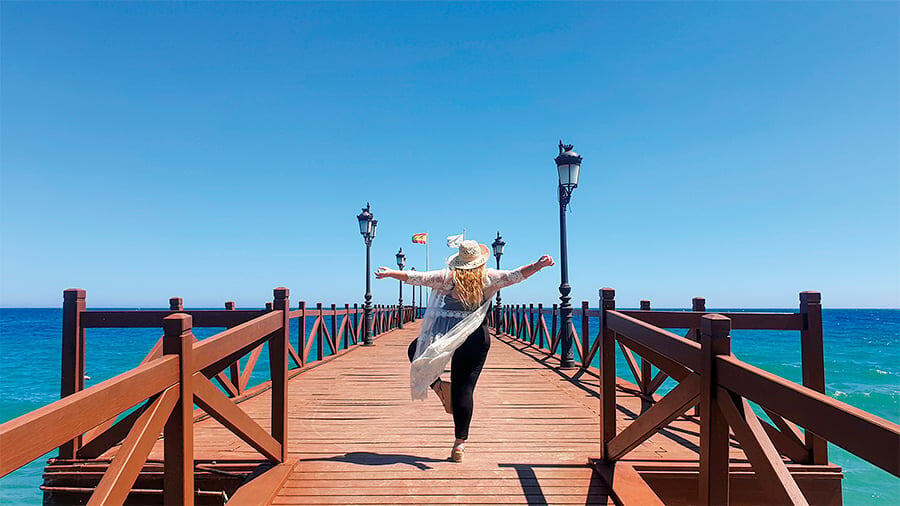
Conclusions.
Our conclusions, in analysing the market in depth, are as follows:
- As we look ahead, the Marbella property market stands on the brink of a sustained period of exceptional growth. The resilience it has displayed since the pandemic is not just a testament to its strength but also an early indicator of what is to come. The current trends and market indicators consistently point towards a continued upward trajectory, with increasing popularity of Marbella, demand and investor confidence driving the market to new heights. We expect this momentum to increase its pace even more in the coming years, consolidating Marbella’s position even further as a leading destination for real estate investment. The market’s performance is not merely a temporary surge; rather, it signifies a profound and sustained expansion phase that will define the region’s property landscape for the coming decades.
- The lack of supply coupled with an increasing demand, will continue to drive prices higher, but the increase in prices in the most expensive areas may be be more moderate.
- Prices are still competitive compared to other luxury destinations. Although prices in the ultra-prime areas have risen to record highs Marbella remains competitive and indeed, has become for many people the “must” place to buy a second, or even a third home for regular use.
- The Marbella property market’s success includes neighbouring areas. Estepona, Benahavís and other neighbouring municipalities along the whole Costa del Sol, will continue to enjoy an increasingly solid market, not only due to the factors described above, but also due to the outstanding features intrinsic to each of these areas.
- Despite the positive evolution of Marbella and the whole Costa del Sol, there remains a lot of work ahead to maintain, preserve and especially improve the quality and sustainability of our environment and the professionalism and quality of our services in the private and public sectors. Our municipal government must set their sights very high and provide us with a level of infrastructure and public services which reach the highest possible quality – equal to the best in the world, and keep them there. The private sector must also make a significant contribution in its own way, including the professionals in all sectors who live and work in the area.
- Quality of life is what really matters to us all, a lesson learned once again during the recent pandemic. Sunshine matters. A friendly and welcoming community matters. A beautiful, well-cared-for environment matters. Great restaurants, year-round events and activities including, music festivals and concerts, sporting competitions, sophisticated nightlife matter. And of course, quality properties are an essential ingredient of the formula. All these special elements combine to give Marbella’s residents and visitors a unique and enviable quality of life and are the reasons for Marbella becoming the highest quality resort destination in Europe.
Copyright © 2024 Christopher Clover and Panorama Properties S.L






